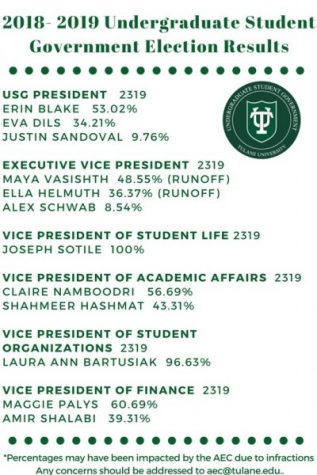Things TU Know: USG Elections

We know how hard it can be to follow the news, especially when groups use a lot of jargon that require inside understanding. In an effort to increase accessibility to our coverage, The Hullabaloo is introducing its newest column, Things TU Know, to help keep students informed.
The Undergraduate Student Government just concluded its Executive Board elections, but some students are feeling confused and out of the loop. The Hullabaloo answers some common questions about USG elections.
What is the AEC?
AEC stands for Awards and Elections Committee. It is a USG committee that supervises and certifies all USG elections. Carrie DiGregorio was appointed AEC Chair this year by USG.
What are infractions?
The AEC has bylaws which the Senate votes to approve. In the bylaws it outlines rules that candidates must follow, like only spending up to $100 on materials for campaigning or not running on a ticket.
Students were able to submit infractions anonymously via OrgSync until elections closed.
Why did voting close last Tuesday but results were announced on Friday?
On Wednesday night the AEC held infraction hearings for the candidates. After the hearings, the AEC made decisions and alerted candidates of its decision. On Thursday, candidates were able to appeal the decisions if they disagreed. The results were confirmed and announced on Friday.
What are run-off elections?
If any candidate does not receive more than 50 percent of the vote, there must be another election between the two candidates with the highest percentage of votes.
This year, Maya Vasishth and Ella Helmuth entered into a run-off election for Executive Vice President. Vasishth was elected EVP after a second round of voting.
In the results that USG posted on Facebook, why don’t the percentages add up to 100?
The AEC decides how much to penalize the candidates by after reviewing infractions. All minor infractions can result in a 1-10 percent docking of points. If the candidates in a given race have percentages that do not add up to 100, that means one or more of the candidates had some of their votes subtracted by the AEC.
Which candidates were infracted, how much they were infracted by and how many votes every candidate receives are not disclosed by the AEC.

Tulane USG posted this graphic to Facebook to announce the results of the elections.
What are the rules about coalitions?
The AEC bylaws forbade coalitions last year. Last November, USG President Sam Levin proposed legislation amending the bylaws and including a specific definition of coalitions.
After pushback in Senate, he amended them again to allow for coalitions and the bylaws were passed in February. Levin has since stated that he supports coalitions.
The bylaws now define a coalition as: “A group of two or more organizations that join together to endorse a candidate running for an elected position.”
Coalitions must register to the AEC before elections start. The Progressive Voter Coalition is the only coalition that registered this year.
What is the Progressive Voter Coalition?
The PVC was a coalition that was started four years ago. It was a group of progressive and multicultural student organizations who endorse candidates for USG.
In past years, the PVC has created a questionnaire for candidates to answer. This year, the PVC held a forum to hear from each candidate for 10 minutes. About an hour before the forum, it was disbanded by the AEC for violating the bylaws.
It was allowed to hold its forum but was not allowed to endorse any candidates as a coalition. The PVC appealed the ruling to the Judicial Council.
What is the Judicial Council?
Last fall, USG created a new group to hear appeals to USG decisions. The council is intended to serve a similar function as the U.S. judicial branch, checking the other branches impartially.
Connor Crowley serves as the chief justice along with four other justices. These justices were appointed by USG.
The council heard its first case after the PVC appealed the AEC’s decision. It voted 5-0, upholding the AEC ruling, while making recommendations to the AEC for next year.
[pdf-embedder url=”https://tulanehullabaloo.com/wp-content/uploads/2018/03/AEC-Bylaws-2.pdf” title=”AEC Bylaws”][pdf-embedder url=”https://tulanehullabaloo.com/wp-content/uploads/2018/03/USG-170902-Judicial-Council-Bylaws.pdf” title=”USG 170902 Judicial Council Bylaws”]Your donation will support the student journalists of Tulane University. Your contribution will allow us to purchase equipment and cover our annual website hosting costs.
















Leave a Comment